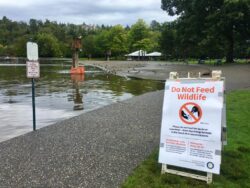I don’t understand why bacteria in my lake is bad. Isn’t bacteria natural? If it isn’t, how does it get in my lake? And how can I stop it?
— Wondering
Dear Wondering:
 Bacteria is really a broad term for microscopic living organisms, which indeed can be found everywhere! The type that we don’t want in lakes is the bacteria that lives in the digestive tract of warm-blooded animals like humans, horses, cows, chickens, cats, dogs, and waterfowl. Yup, poop. Poop indicates pollution in your lake.
Bacteria is really a broad term for microscopic living organisms, which indeed can be found everywhere! The type that we don’t want in lakes is the bacteria that lives in the digestive tract of warm-blooded animals like humans, horses, cows, chickens, cats, dogs, and waterfowl. Yup, poop. Poop indicates pollution in your lake.
Unless human sewage is reaching the lake from failing septic systems or combined sewer overflows, most bacteria present are likely from animals. For most lakes, geese, gulls, and ducks are probably a significant source of bacteria, especially when large resident bird populations move in.
State and local agencies monitor bacteria to watch for possible health risks to people swimming, fishing, or otherwise coming into contact with lake waters. Testing can show problem areas that may indicate sewage or stormwater runoff pollution. Sewage could come from failing septic systems. Stormwater is rainwater that falls on your land and runs into the lake, sometimes carrying bacteria and other contaminants with it.
What do you do to fix a poop problem?
Does your local health department monitor your beach for poop? If they do, they may sometimes close the beach because of high bacteria levels. When a beach is closed for high bacteria, agency staff try to identify the source of the poop, consulting with field staff who sample the beaches and park staff to understand what has been going on at and near the beach. They may also contact local sewage utilities about the possibility of a spill. Some programs may also send samples to a lab to determine the type of animal that’s the source of the poop.
Once they understand more about the poop source, health program staff work with beach managers to help keep poop out of the water. Every beach is unique, but some things they might do are:
- Remind people that dogs are not allowed at the swimming beach, and that geese and ducks should not be fed near the beach.
- Clean up goose poop from docks to keep it out of the water at the swimming area.
- Reduce the number of geese near the beach by using shiny mylar strips (“scare tape”) or specially trained dogs.
- Renovate docks to allow more water circulation through the beach area.
- Improve drainage in the park area near the beach to reduce bacteria washing into the lake there.
- Reduce poop getting into streams near beaches.
To find out if your lake swimming beach is monitored for bacteria, look for your county’s monitoring program: https://www.walpa.org/lakes-resources/lakewq/ And thanks for caring about the health of our lakes!
To submit questions to Dr. Waterline, please fill out the form below.
We look forward to crafting answers to your conundrums.

